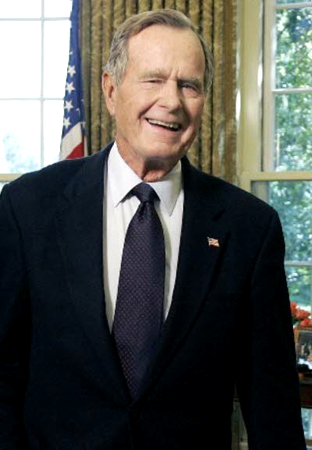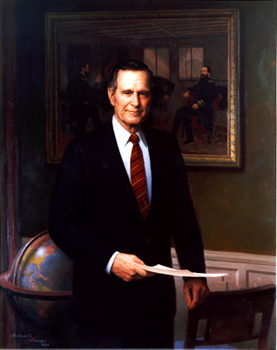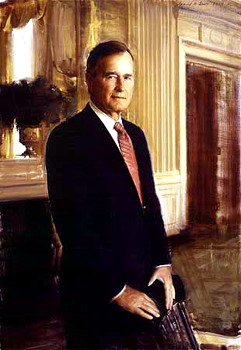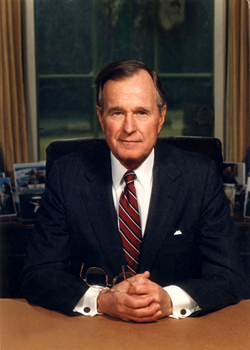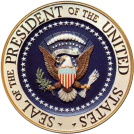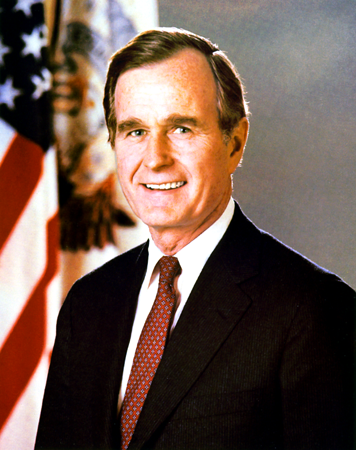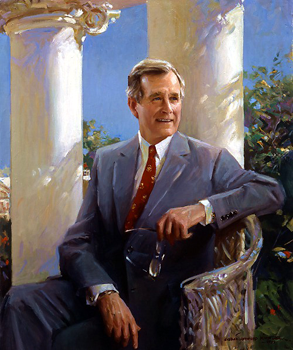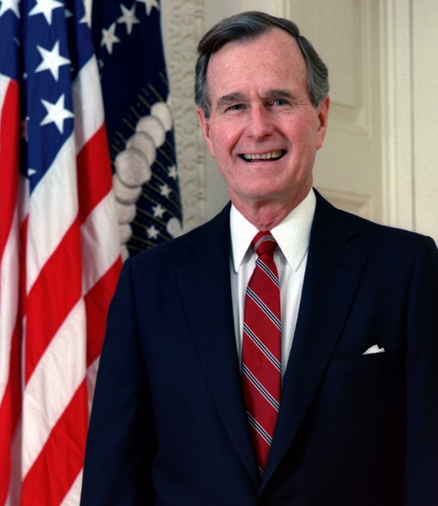|
GEORGE BUSH |
|
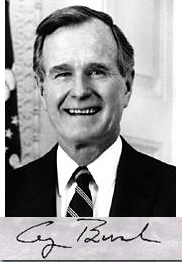
THE 41ST PRESIDENT OF
THE UNITED STATES OF AMERICA
(1989-1993)
BUSH, George Herbert Walker
(1924– ), 41st president of the U.S. (1989–93).Bush was born on June 12, 1924, in Milton, Mass., and grew up in Greenwich, Conn. A World War II carrier pilot in the Pacific, he was discharged in 1945 with a Distinguished Flying Cross. During the war he married Barbara Pierce (1925– ). They had six children (one died in early childhood). Graduated from Yale University in 1948 with a degree in economics, Bush moved to Texas, where he became wealthy in the oil business.
Bush ran unsuccessfully for the U.S. Senate in 1964 but won a seat in the House of Representatives in 1966. Reelected in 1968, he gave up his seat in 1970 to run for the Senate—again unsuccessfully. President Richard M. Nixon then appointed him ambassador to the UN (1971–72), and he subsequently held a series of appointive posts that familiarized him with both the internal and external politics of the U.S.: national chairman of the Republican party (1973–74); chief liaison officer in Beijing (1974–75), before the U.S. established full diplomatic relations with China; and director of the Central Intelligence Agency (1976–77). Bush competed for the Republican presidential nomination in 1980 but lost to Ronald Reagan. He ran as Reagan’s running mate, and became vice-president in 1981.
The 1988 Campaign.
After winning reelection on the Reagan ticket in 1984, Bush won the 1988 Republican presidential nomination; as his running mate he chose a U.S. senator, Dan Quayle of Indiana. During the campaign Bush denounced his opponent, Massachusetts governor Michael Dukakis (1933– ), for "liberalism" and promised no new taxes. He became the first incumbent vice-president since 1836 to be elected president.
Bush as President.
Dominating Bush’s domestic agenda during 1989, his first year in office, were measures to rescue the nation’s savings and loan system and to toughen U.S. efforts against illegal drugs. He responded to rapid political changes in Eastern Europe by offering economic assistance to Czechoslovakia, Hungary, and Poland and by encouraging the unification of East and West Germany into a country that would remain a Western ally, retaining its position in the North Atlantic Treaty Organization. He met with Mikhail Gorbachev, president of the USSR, in December 1989 at Malta, where they agreed to negotiate an end to production of chemical weapons, cut long-range missiles by up to 50 percent, and reduce conventional forces in Europe. Later that month, Bush ordered more than 24,000 U.S. troops into Panama to oust the government of Gen. Manuel Antonio Noriega (1936– ). Taken into custody and flown to the U.S., Noriega was later tried and convicted on drug and racketeering charges.
In 1990 Bush and the Congress engaged in a protracted dispute over the size of the federal budget. In the end Bush retreated from his "no new taxes" pledge and signed a deficit-reduction bill that slowed the growth of spending but also increased taxes. In foreign affairs Bush’s leadership was more sure-footed. After Iraq seized Kuwait in August 1990, Bush immediately sent U.S. troops to protect Saudi Arabia and began a vigorous campaign for international support for an effort to reverse the Iraqi conquest. After the UN-imposed deadline for Iraqi withdrawal expired on Jan. 15, 1991, a U.S.- led coalition launched a major offensive. Five weeks of air warfare led to a ground attack that drove the Iraqi army from Kuwait in less than 100 hours. Bush’s popularity soared after the victory and remained high as he met with Gorbachev in July and signed a strategic arms reduction agreement. During the remainder of 1991 foreign-policy developments, including the breakup of the USSR and the convening on October 30 of the first comprehensive Middle East Peace Conference, continued to claim his attention even as the U.S. economy continued to lag. Both unemployment and the budget deficit increased steadily. By January 1992 Bush’s approval rating in opinion polls was half what it had been in early 1991.
The 1992 Campaign.
In Republican primaries, Bush defeated conservative commentator Patrick J. Buchanan (1938– ). In the general election, however, Bush and Quayle lost to Democrats Bill Clinton and Al Gore, who attacked the Bush administration’s performance on the economy, health care, and the environment. During his last weeks in office, Bush remained active in foreign policy. He sent troops to restore order and feed the starving in Somalia, ordered new air strikes against Iraq, and signed a wide-ranging arms reduction treaty with Russian president Boris Yeltsin. In December Bush, along with President Carlos Salinas de Gortari (1948– ) of Mexico and Prime Minister Brian Mulroney of Canada, signed the North American Free Trade Agreement.
Assassination attempts & plots.
April 13, 1993: After Bush left the White House, fourteen men believed to be working for Saddam Hussein smuggled bombs into Kuwait to assassinate former president Bush by a car bomb during his visit to Kuwait University several months after he had left office. The plot was foiled when Kuwaiti officials found the bomb and arrested the suspected assassins. Two of the suspects, Wali Abdelhadi Ghazali and Raad Abdel-Amir al-Assadi, retracted their confessions at the trial, claiming that they were coerced. Bush had left office in January 1993. The Iraqi Intelligence Service, particularly Directorate 14, was proved to be behind the plot.
On June 27, 1993 President Bill Clinton ordered retaliation against Iraq as part of Operation Southern Watch; 23 Tomahawk cruise missiles were fired against the Iraqi Intelligence Headquarters. Clinton had decided to act based on three pieces of evidence: first, suspects in the plot confessed to FBI agents in Kuwait. Second, FBI bomb experts linked the captured car bombs to the same explosives made in Iraq, including a 175-pound car bomb found in Kuwait City on April 14. Third, intelligence reports confirmed that Saddam had been plotting to assassinate the former President for some time. Leaders from both parties supported Clinton's attack.
Later Years.
After leaving the White House, George and Barbara Bush retired to Houston. She published a 1994 memoir and remained honorary chair of the Barbara Bush Foundation for Family Literacy, established while she was First Lady; he co-authored A World Transformed (1998), a study of U.S. foreign policy. The George Bush Presidential Library and Museum at Texas A&M University in College Station was dedicated in 1997. Their eldest son, George W. Bush, was elected governor of Texas in 1994; reelected in 1998, he narrowly defeated Vice-President Al Gore to win the U.S. presidency in 2000. Another son, John Ellis (Jeb) Bush (1953– ), won the Florida governorship in 1998.
